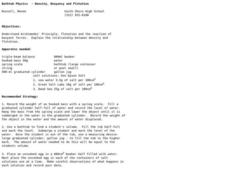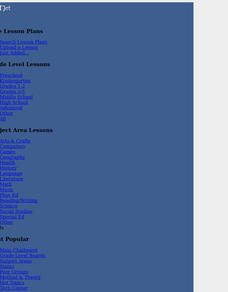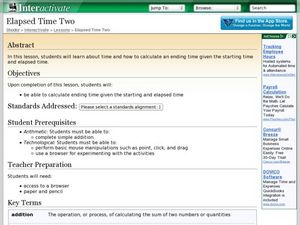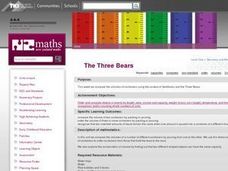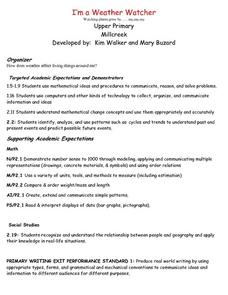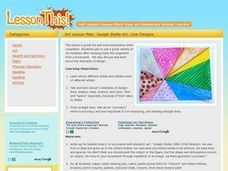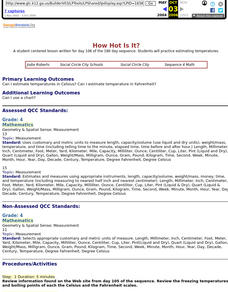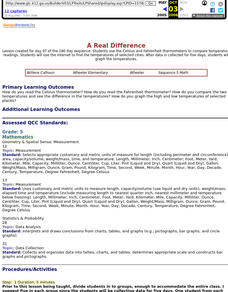Curated OER
Geometry in Nature
Students examine how the circumference, diameter, and the relationship of Pi of a circle are related. They count the summer rings of a tree to determine its growth.
Curated OER
Telling Time to 5 Minutes
Young scholars take part in various activities ranging from creating a human clock, to small group problem solving to reinforce the concept of telling time accurately to five minutes on an analog clock.
Curated OER
Chocolate Chip Cookie Mining
Student pretends to be a research scientist for a mining company. They work in a laboratory that investigates methods of getting useful minerals from rocks. They complete experiment using chocolate chip cookies.
Curated OER
Parachutes: What Affects a Parachute
Students create a simple paper parachute. In this parachute design lesson, students examine the effects of the wind and make napkin parachutes.
Curated OER
Our Favorites
Pupils participate in and conduct a survey to determine various class favorites. They collect, organize and display their data, interpret the results, and complete a packet of worksheets to display the information.
Curated OER
Bathtub Physics - Density, Buoyancy and Flotation
Students study Archimedes' Principle, flotation and the reaction of buoyant forces and explain the relationship between density and flotation.
Curated OER
The Gingerbread Man
In this unit students use the traditional tale of the gingerbread man as a context for ordering and comparing lengths. They compare the length of two objects directly, order three or more objects by length and select objects that are...
Curated OER
Paper Planes
In this unit, 3rd graders investigate one variable to see if they can make a paper plane fly farther. They use scatter plots to establish a possible relationship between variables then use what they have found to make a paper plane to...
Curated OER
Lesson Exchange: Polygons (Middle, Mathematics)
Pupils discover the relationship between the sides of a polygon and the number of diagonals that can be drawn from one vertex, the number of triangles that those diagonals form, and the sum of the interior angles of that polygon.
Curated OER
Clockwise
Second graders investigate angles through this series of lessons. They determine how angles turn in both clockwise and anticlockwise directions. They examine the characteristics of quarter half turns and how they can begin from any...
Curated OER
Trains
Pupils compare the lengths of the train through calculation. This calculation can be done by knowing the values of the rods. Students use problem solving to get the answer to the problem before them.
Curated OER
Elapsed Time Two
Learners study how to calculate elapsed time. For this elapsed time lesson, they determine how to calculate the ending time of an event when they are given the starting time and the elapsed time. They participate in direct instruction,...
Curated OER
The Three Bears: Comparing and Ordering
Students explore comparing and ordering volume of containers. They use the context of Goldilocks and the Three Bears to compare the volume of various containers by packing or pouring.
Curated OER
I'm a Weather Watcher Watching plants grow by......my,my,my
Students investigate how weather affects how plants grow. They collect data on weather and plant growth for a week and display the data on a graph. For a culminating experience they design a movie using software that shows plant growth...
Curated OER
Literal Equations
Students explore Literal Equations. In this literal equations lesson plan, students use the Internet to connect to links and solve linear equations. Students investigate, analyze and record their findings on various activity worksheets.
Curated OER
Joseph Stella Art: Line Designs
Students discover the focal point in pictures and create their own images using lines and space. In this art analysis instructional activity, students create a black dot on a white paper which becomes a focal point for the lines...
Curated OER
Dressing in Early American Times
Fifth graders, by doing research and seeing actual and simulated artifacts, gain knowledge of and make comparisons about clothing in the Colonial and early Republican eras with attire of present time.
Curated OER
Motion in Two Dimensions
Two activities employ the use of kinematic equations for determining projectile ranges. They both require the use of a toy dart gun. Included in this resource are both the teacher's guide and student laboratory sheets. This is an...
Curated OER
Angles: Angles, Angles, Everywhere
Students estimate and accurately measure the size of angles communicate with the appropriate geometric terms and symbols to describe and name angles, lines, line segments, rays
Curated OER
Density
Students, in groups, design a procedure to calculate the mass of gas molecules in the classroom by measuring the volume of the classroom and researching the density of air. They apply changes in air density with altitude and effects on a...
Curated OER
Nature's Air Conditioner
Students observe the process of transpiration in leaves. They measure how much water a leaf gives off in a 24-hour period, calculate the volume, and answer discussion questions.
Curated OER
Specific Heat of Metal
Students experiment with different types of metal by dipping them in boiling water and cool water and recording temperature changes in the water. By doing this, they find the specific heat of the metals.
Curated OER
How Hot Is It?
Fourth graders practice estimating temperatures. They practice in Celsius and Fahrenheit.
Curated OER
A Real Difference
Fifth graders use the Celsius and Fahrenheit thermometers to compare temperature readings. They use the Internet to find the temperatures of selected cities. After data is collected for five days, 5th graders graph the temperatures.





